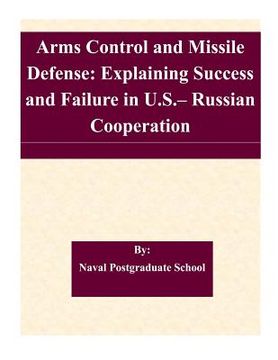Share
Arms Control and Missile Defense: Explaining Success and Failure in U.S.- Russian Cooperation (in English)
Naval Postgraduate School
(Author)
·
Createspace Independent Publishing Platform
· Paperback
Arms Control and Missile Defense: Explaining Success and Failure in U.S.- Russian Cooperation (in English) - Naval Postgraduate School
$ 10.36
$ 12.95
You save: $ 2.59
Choose the list to add your product or create one New List
✓ Product added successfully to the Wishlist.
Go to My WishlistsIt will be shipped from our warehouse between
Monday, July 08 and
Tuesday, July 09.
You will receive it anywhere in United States between 1 and 3 business days after shipment.
Synopsis "Arms Control and Missile Defense: Explaining Success and Failure in U.S.- Russian Cooperation (in English)"
Russia can no longer be considered a world superpower, but it remains a great power in terms of strategic global security. Russia's importance is based on its nuclear arsenal and permanent seat on the United Nations Security Council. This research analyzed arms control and ballistic missile defense (BMD) in order to explain the success and failure of cooperation between the United States and the Russian Federation. Utilizing international relations theory, realist and constructivist frameworks were applied to two separate case studies: U.S.-Soviet cooperation on the Intermediate Nuclear Forces Treaty and U.S.-Russian failure to cooperate on BMD. Each case was started with material factors that opened the opportunity for the Soviet and Russian Federation elite to be responsive to new ideas. The elite then turned to the state's intellectual entrepreneurs to find new ideas. In the case of the Soviet era, the elite chose to cooperate due to the influence of the international organizations they were associated with. In the present day, the elite, many of whom have a background in the Soviet and Russian Federation secret service, have chosen to defect from cooperation due to the socialization received during their time as KGB or FSB officers.
- 0% (0)
- 0% (0)
- 0% (0)
- 0% (0)
- 0% (0)
All books in our catalog are Original.
The book is written in English.
The binding of this edition is Paperback.
✓ Producto agregado correctamente al carro, Ir a Pagar.

